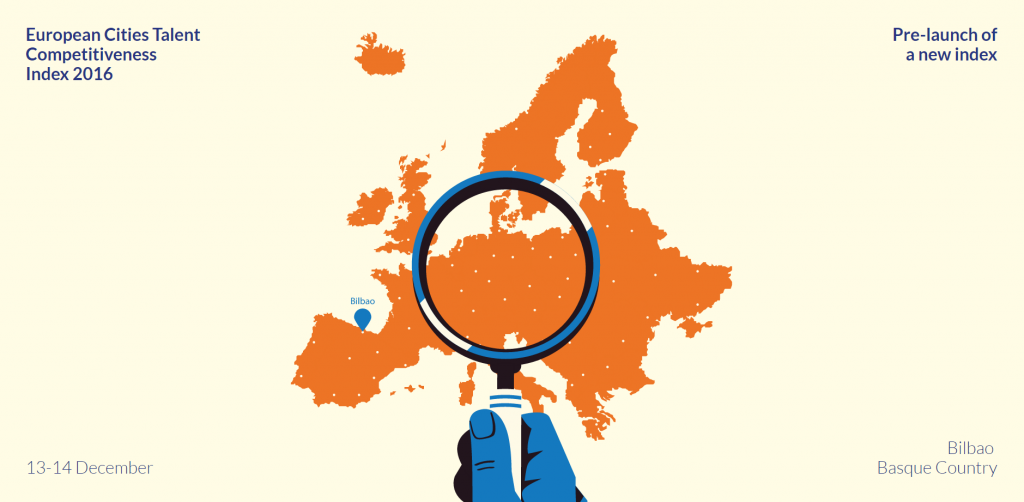
Bilbao becomes the seat of European Talent
2016/11/29
On 13 and 14 December Bilbao will become the seat of European talent thanks to the European Cities Talent Competitiveness Index Conference 2016 (ECTCI) with the stage of the Dome Hall of the Campos Eliseos theatre as a platform.
Bizkaia talent has organized this conference together with Tendensor International, a strategic consultancy focused on the management of brand image and the attraction and innovation capacity of cities, regions or clusters. Since 2003 Tendensor International, whose main activity is based in the Nordic countries, has managed a large number of projects for regions, cities and business groups, especially in the area of place branding.
Several actions and policies carried out by cities such as Copenhagen, Berlin or Gothenburg to improve their ability to be attractive for talent will be presented to the international community as well as the aforementioned index.
This index is the result of a pioneering pilot project at the global level promoted by the Provincial Council of Bizkaia through the association to attract, retain and link talent, bizkaia talent, in collaboration with Bruno Lanvin’s team. Bruno Lanvin is INSEAD’s Executive Director for Global Indices, such as the Global Innovation Index or the Global Talent Competitiveness Index – GTCI, and throughout his professional career he has worked for the United Nations and the World Bank, among others. The Professor has also received assistance from numerous Basque agents to carry out this work.
The aim of the Index is to lay the foundations for a local talent competitiveness index based on a robust methodology and legible rankings, so as to establish a small number of strategic priorities through which Bilbao, Bizkaia and the Basque Country could foster their competitiveness for talent.
This report is based on the methodology established in the Global Talent Competitiveness Index (GTCI), which is the global benchmarking index to compare the ability of countries to attract talent. The project started at the end of 2015 and the result was recorded in the European Cities Talent Competitiveness Index, ECTCI.
In addition to meeting Professor Lanvin, those who attend this international event will also have the opportunity to hear a firsthand account of the knowledge and experiences of Burkhad Voldbracht, Niklas Delersjö and Morten King-Grubert. They represent some of the most innovative European organizations related to talent management from a territorial point of view and based in the highest ranked cities in the ECTCI, that is, Berlin Partner, Global Talent Gothenburg and Copenhagen Capacity.
The managing director of bizkaia talent, Ivan Jimenez, points out that “when we talk about improvement in citizens’ prosperity and wellbeing it is usually local governments which have to try and apply the most effective political initiatives in order to achieve an appropriate ecosystem”.
In fact, according to the OECD 2014 estimates, local/regional authorities are responsible for around 40% of total public expenditure and for 60% of public investment in the OECD area.
This can also be applied to the policies to be followed with a view to being an attractive place for talent, which used to be a competition between states and is now a competition between metropolitan areas and/or regions.
TALENT COMPETITIVENESS INDEX BY CITIES
Cities and regions do not only compete for talent but often act as leaders which define new ways of developing, attracting and retaining talent. Cities and regions, which are competitive at a global level and relevant from a local and/or regional point of view, attract external knowledge and identify new roles and opportunities for themselves in the global economy.
The ECTCI index is an instrument which will enable the area of Bilbao, Bizkaia, Basque Country to measure its strengths as well as its weaknesses, anticipating the challenges and the needs which will be encountered in the next years as a consequence of both the lack as well as the mobility of highly-qualified staff. “All this will be reflected in the improvement of the ability to compete for the attraction and retention of the best talent at the global level, one of the main challenges that advanced economies will have to face in the next decades”, Jimenez pointed out.
Two of the highest ranked cities are Copenhagen and Gothenburg, the cities two of the lecturers at the Conference come from, from which numerous practices can be learnt and adapted.
Furthermore, Jimenez states that even though large cities and metropolitan areas have some undeniable advantages, “medium-sized cities, due to their flexibility, are carrying out activities and strategies which can be used as a reference, thus promoting a collaborative ecosystem between different social agents in the development of the various plans and activities”.
“Those who attend this meeting will find out the position Bilbao occupies in the ranking of the 27 cities which represent a similar section of EU regions”, the Managing Director of bizkaia talent advanced.
The study will be presented and analyzed in depth on Wednesday, 14 December, under the theme Talents and Globalization: opportunities and challenges for Bizkaia.
Moreover, this study will reveal the main strengths and weaknesses of the areas of Bilbao, Bizkaia, Basque Country throughout the dimensions of talent competitiveness, as well as the specific short and long-term action points to be taken into account by the various agents of the public, private and academic sphere.
SPEAKERS
In addition to Professor Bruno Lavin, speakers at the conference include the Managing Director of bizkaia talent Ivan Jimenez.
Another speaker will be the Head of the Talent Services Unit of Berlin Partner, Burkhard Volbracht, who has been working on issues related to talent attraction in that organization for nearly a decade, as well as the head project manager of Global Talent Gothenburg, Niklas Delersjö, who has several years of experience in regional development projects, often in collaboration with multiple stakeholders. In 2015 he was part of the team who managed to put together a platform comprising universities, companies and public authorities in order to develop the talent attraction and retention strategies of the region.
Another of the participants at the conference will be Morten King-Grubert, Senior Adviser at Tendensor International Copenhagen and one of the authors of the book “Innovating Talent Attraction”, who has been one of the main architects behind the talent attraction and retention efforts of Copenhagen Capacity for seven years.
The moderator will be Pärtel-Peeter Pere. The CEO of Tendensor International has been working in talent attraction in the Nordic countries as well as internationally for years and has been part of the jury at the City Nation Place conference.
Download the program HERE








